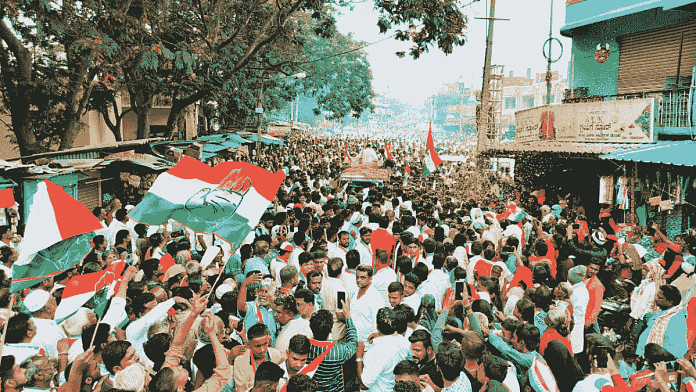Bengaluru: Top Karnataka Congress leaders, including former chief minister Siddaramaiah and state unit president D.K. Shivakumar, were unaware of the promise in the party’s manifesto to “ban” organisations like the Bajrang Dal until it hit the headlines, multiple leaders close to them have told ThePrint.
The sources said that the clause had been inserted by manifesto committee vice-chairman K.E. Radhakrishna, with the approval of Randeep Surjewala, the All India Congress Committee general secretary in-charge of Karnataka.
In its manifesto, the Congress allegedly said it would ban the Bajrang Dal — the youth wing of the Vishva Hindu Parishad — and the outlawed Islamist group Popular Front of India, saying such organisations promoted “enmity or hatred” against communities.
While the Bharatiya Janata Party (BJP) was quick to seize the opportunity, presenting the alleged promise as an attack on Lord Hanuman (Bajrang Bali), the Congress has since denied it had used the word “ban”, saying that it only promised action against such outfits and that banning organisations was not the state government’s realm of powers, according to media reports.
ThePrint reached both Radhakrishna and Surjewala for a comment on the matter by text and call. While Surjewala didn’t respond, Radhakrishna said he was unwell.
ThePrint also reached Shivakumar and Siddaramaiah. This report will be updated when a response is received.
Sources close to Surjewala, meanwhile, told ThePrint that the manifesto committee was aware that a clause mentioning the two outfits was being included.
“It was thought that mentioning the Bajrang Dal would consolidate Muslim votes and mentioning the PFI would also counter the BJP’s allegation that the Congress would remove the ban on the organisation,” a source close to Surjewala told ThePrint.
‘Deliberate choice’
Coming as it did less than 10 days before the Karnataka elections, the Bajrang Dal controversy has threatened to scuttle the Congress’ strategy — so far focussed on local issues — and bring Hindutva to the centrestage.
Meanwhile, the BJP has been trying to corner the Congress on the topic. Addressing a poll rally in Vijayanagara district hours after the Congress released its manifesto, Prime Minister Narendra Modi claimed that the Congress first tried to lock up Hindu god Ram and now it was trying to do the same with those who chant ‘Jai Bajrang Bali’ (Hail the lord Hanuman).
On its part, the Congress has gone into damage control mode — on Tuesday, a day before the state votes, Shivakumar visited Hanuman temples and promised to construct one if the party came to power.
A day before Karnataka votes, the Congress is still assessing what damage the Bajrang Dal controversy could do to its electoral prospects.
However, at least four senior Congress functionaries in Karnataka confirmed to ThePrint that neither Shivakumar nor Siddaramaiah knew that such a clause was inserted in the manifesto.
A party functionary privy to the deliberations told ThePrint that although the highlights of the manifesto were shared with them in a meeting, the promise of a ban on organisations like the Bajrang Dal wasn’t mentioned.
“Vice-chairman of the campaign committee, K.E. Radhakrishna, included it in the manifesto, and the same was signed off by AICC general secretary in-charge Randeep Surjewala. Neither Shivakumar or Siddaramaiah were informed of the decisions,” he said.
Another functionary told ThePrint that it was a “mistake” and happened because of oversight.
“None of us knew the contents of the manifesto as we didn’t have time to read the draft. We also found out that this element (about Bajrang Dal) was there when it hit headlines,” said a third functionary, adding that while there was a discussion in the AICC to put something about action against extremist religious organisations in the manifesto, it was a retrospective decision to name the PFI and the Bajrang Dal.
Sources close to Surjewala, however, said that it was a conscious decision to include both Bajrang Dal and PFI. After much deliberation, the leaders decided to name Bajrang Dal, a leader who didn’t want to be named told ThePrint.
“Had we not said anything about the PFI or any ban, it would have been seen like we haven’t taken a stand against terrorism. But had we chosen only to put Bajrang Dal and not a banned organisation like PFI, then we would have been seen doing minority appeasement again,” a leader said.
“There were discussions on which organisation would prove to be least damaging for us. The Bajrang Dal is an active organisation, but its political effect is very limited. Most people who vote for the BJP after being influenced by the Bajrang Dal are not fence sitters, so it would cause us much harm,” the leader added.
(Edited by Uttara Ramaswamy)
Also Read: How Congress is betting on Kharge and ‘divide & rule’ strategy to corner SC votes in Karnataka



